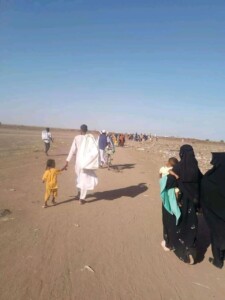‘Less food rations’, Sudan refugees in Chad complain
Sudanese refugees in Kounoungo camp in eastern Chad have complained of food shortages caused by delays or the non-distribution of rations.
 Women line up to receive their monthly ration in the Djabal camp, in eastern Chad (WFP, 2015)
Women line up to receive their monthly ration in the Djabal camp, in eastern Chad (WFP, 2015)
Sudanese refugees in Kounoungo camp in eastern Chad have complained of food shortages caused by delays or the non-distribution of rations.
Leader of the camp community Sheikh Adam Yahya El Nadeef, said that the refugees have not received food rations for the months of August and October. The rations of September have been provided to people in the camp.
El Nadeef explained that the World Food Programme (WFP) which operates in eastern Sudan has presented a re-inventory plan of food cards to them in July. It would help classification and provision of food for the refugees who are in need of aid only.
According to him the refugees rejected the programme’s plan on the grounds that they “are all poor and in need of aid”. Yet the humanitarian organisations did not provide food for the current month and August.
“The programme returned to us and provided rations in September. It has not yet provided the rations for the month of October.”
The situation is becoming dangerous, said El Nadeef. He appealed to the WFP to provide food to the refugees.
The WFP writes on its website that “due to limited resources, WFP prioritises assistance to those most in need, to ensure that people have enough to eat. But at the moment, refugees from Sudan and the Central African Republic (CAR) are currently receiving only 40 per cent of the planned rations.”
Chad is an arid, low-income and land-locked country, suffering from chronic food insecurity, denoting alarming levels of hunger. The Global Hunger Index for 2017 places Chad second last out of 119 countries, a WFP Chad country brief reads.
El Nadeef reported in September that a Chadian organisation responsible for the distribution of food decided to divide the Sudanese camp residents into three categories: capable, medium and vulnerable – and subsequently focused its distribution on the two most needy groups. Food distribution to “the capable” stopped in early August, he claimed.
Return plan for refugees
Since 2003, Chad has been hosting over half a million refugees from neighbouring countries deeply affected by fragile security situations, including more than 300,000 Sudanese refugees who reside in camps in eastern Chad.
In April this year, the first large-scale voluntary returns from Chad took place when the UNHCR and the Commissioner of Refugees (COR) assisted dozens of Sudanese refugees from Chad in their return to Kabkabiya, Saraf Omra and Karnoi. The operation is planned to continue in December.
In the past months Sudan has proposed plans for the return of displaced families to their areas of origin, or integrate them into other residential areas. North Darfur state recently approved a plan to turn three camps for displaced people into permanent residential areas for 45,000 families.











 and then
and then